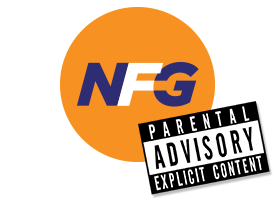Every criminal defense attorney I know regularly gets asked “The Question” — “How do you represent those people?” My knee-jerk reaction to “The Question” is usually a two-word answer that starts with “Fuck” and ends with “Y**.” However, after 22 years as a criminal defense attorney — and a small fortune’s worth of therapy to try and learn how to effectively express my emotions, other than just blind rage — I now have some more nuanced thoughts:
If you meet a criminal defense attorney and you hope to have a pleasant relationship with that person, do NOT bombard them with “The Question” until you have spent at least six hours discussing other matters with them. While I certainly don’t claim to speak for the vast majority of my peer group, I’m pretty confident that almost all of us take this question as a direct attack on our life’s work. When you ask, “How do you represent criminals?” I hear “What kind of effin’ scumbag are you since we ALL know EVERYONE arrested and charged MUST be guilty?” This is typically not a good beginning to a conversation, especially if I don’t really know you.
There is a traditional stock answer to “The Question” — something along the lines of, “our Constitution requires zealous advocacy for all persons accused of crimes and the system doesn’t work if defense attorneys aren’t there to speak truth to power.” I happen to believe this is true, but I also believe most people who hear the stock answer think it’s some B.S. defense attorneys say to themselves so they can sleep better at night.
I think the reason I do this for a living is that I have a deep, abiding, and nearly unshakable distrust of institutions which manifests itself in a tremendous problem with authority. I tend to believe that, if you get three people together in a room, two of them are going to start trying to figure out how to screw the third and it spirals out of control from there. Therefore, when you tell me the legislature or congress got together and decided to punish individuals for certain conduct, I innately think “I wonder how they effed this one up.” Likewise, if you tell me “< insert name of law enforcement agency> is investigating Joe for <insert authority-created title for alleged criminal activity>,” my first thought is not “Yay, they’re going to protect us from Joe.” Instead, my first thought is “Joe is getting ready to get screwed.”
For a long time, I believed the vast majority of people could not possibly relate to these feelings and so I would respond to “The Question” by spitting out some version of the traditional stock answer while suppressing the seething anger trying to bust out of me. If I was feeling particularly honest, I might say something like, “Well, I’m not such a bad guy to know if your kid ends up in jail at 3:00 in the morning,” and then move along wondering why I have a hard time making friends.
In light of publicity concerning numerous exonerations of people who served 5, 10, 20, 30, or more years in prison for crimes they didn’t commit, the current legal/political fight in D.C., and a growing tidal wave of distrust in our government, many people are starting to come around to my views. However, I still believe most people really don’t comprehend they could suddenly become one of “those people” or “criminals,” depending on a whole bunch of factors totally outside of their control. My observation has been that just about everyone who gets stopped, searched, arrested, and/or charged with a crime thinks “they shouldn’t be able to do that to me” regarding at least some part of the process. Yet, not very many people realize those injustices are happening all day, every day, all across the country.
With all this in mind, I am trying to pleasantly give my new, more nuanced answer to “The Question”: “I represent people who have been ACCUSED because, if I haven’t learned anything else, even the best-intentioned law enforcement officers, prosecutors, and judges can make horrible mistakes. And the only way to make sure those horrible mistakes don’t destroy the lives of innocent people is to fight tooth and nail with these SOBs in EVERY case, no matter whether I think the person is ‘guilty’ or not.”
Please think about it like this: someday, you or someone you love might have to walk through the door of my office. If that day ever comes, I promise you won’t want me spending my time trying to figure out if the person accused actually “did it” or is otherwise worthy of a defense – you will want me figuring out how to get that person out of the trap.
If you don’t understand that possibility, you’re not paying attention.




12 Responses
Reagan, I love it!
Being married to a defense attorney I get the question all the time too. Good job!
Dude, so stoked you started a blog. Of course, I’m familiar with some of your musings from working for you years ago, but it is still entertaining and informative. Also, like you, I feel fuck is not only the most versatile word in our language, but one of my favorites too!
Reagan Wynn, your a badass! This is why you are among the best of the best. I’m not sure what I admire most about Reagan Wynn. There is a very long list but I can narrow it down to his gift of unprecedented brilliance, his ability to successfully produce results for the under-dog or how he is one of those rare human beings that make you want to be a better person. Period.
I like the way your mind works.
Reagan Wynn IS a total badass. When the government inevitably comes for me I hope Reagan Wynn is my defense attorney. Because I want to if “win”, LOL!
Love your first post and will definitely be following. Being able to make people laugh, empathize and understand a point of view is a the work of a great communicator. Thank you for posting! And please never apologize for questioning authority and helping the other side.
You da man!
You the main man!
This blog will be one of my favorites to watch and read. Knowing Reagan is enough, but reading the first post assures the fun in his words. Thank you Counselor.
NFG
Hear, hear!
I wholeheartedly endorse this publication.